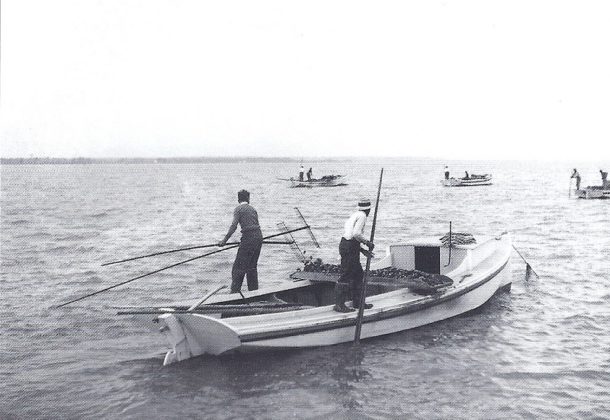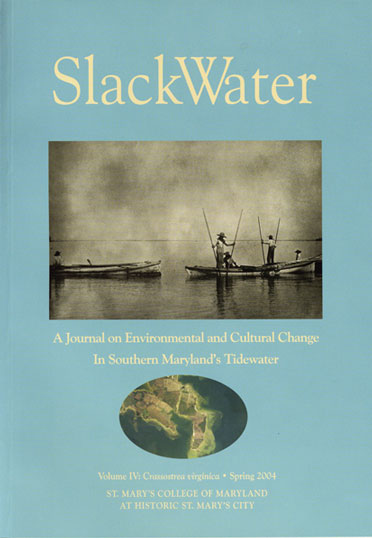SlackWater: Calming the Waters

The SlackWater Center at St. Mary’s College of Maryland is a consortium of students, faculty, and community members documenting and interpreting the region’s changing landscapes. Oral histories are at the core of the center, which encourages students to explore the region through historical documents, images, literature, and scientific and environmental evidence. Some of this work has been published in the print journal SlackWater, some of which is online and some published here. The work below was first published in SlackWater Volume IV Crassostrea virginica in spring 2004.
By J. Frank Raley as told to Bo Knutson
There’s always a tension in America, as Jefferson and Hamilton state it: what is the role of government in society? I’m sometimes on one side, and sometimes on the other. I think government can be used in a very positive way, and the question is how to use it in the best way. My approach to the issues of this area has not been philosophically anti-government or pro-government. We certainly needed to do something about the issue of a war on the Potomac and about developing more infrastructure and an economic base.
My only philosophical point is that we can’t make government impotent, that we should use it when we need to use it. In 1940, we had 18,000 people in this County and when I came [back from the service], there had been very little basic change in response to the new influx of people that came in 1944. It was the same old government, the same old politics, the same old culture directing it.
I ran for office three times, but every time I ran, I had to figure that I was only going to win if I carried a heavy vote from the new population brought in by the base [Patuxent River Naval Air Station]. That’s how I did win, every time. The Potomac River Compact was a break with, and generally opposed very strongly by, the County. This was a change taking place, and it was resisted. The new people would vote for, and the old would vote against. The intensity of the divide between the old and new people was very bitter, and it was difficult for a politician to strive to keep that balanced while trying to put policies together. The watermen did not like regulation, and the old system was sympathetic. The political ruling body kept enforcement at the lowest level possible, and the police either followed that or were transferred. The old leadership was built on laissez-faire, as far as public problems were concerned. It played out very well for a long time because Southern Maryland didn’t want much government. It’s been generally a states-rights supporter. They wanted minimal government, they wanted no government interference.
If you calm the waters and are able to develop a unified management system, that will undoubtedly create a greater return on the economic basis in addition to stopping all the conflicts. I strengthened regulation quite a bit by giving more support to the police in the enforcement of the laws on the common, open seas. That hurt me some politically, but if you don’t support the enforcement of laws, it’s going to deteriorate.

Copies of this Slackwater Volume IV are available here.
The complexities of the Compact of 1785 were not easily understood or widely known, and there was a lot of emotion that got involved. The reason the Compact was abolished was simple: it was a way to clean the air. Negotiations had gone on for hundreds of years between Maryland and Virginia in an attempt to resolve things. Either one or the other would not resolve it. In the past, Maryland offered Virginia joint management of the Potomac, and they turned it down. The Potomac River Compact was a catalyst that really did bring about some kind of settlement. It brought back Maryland’s right to have joint management of the river. The watermen will tell you about the Potomac River Compact and how they had their rights taken away. They’re mixed up on that, but that’s what they think. The decision was on its way to the Supreme Court, and it was going to be one way or the other way.
Other stories from SlackWater Volume IV Crassostrea virginica:
- There’s no sign that warns, “Beware of Time,” at this gateway to St. George Island where time becomes as porous as the sands and silts that constitute it. In this liminal land amid three rivers, things are slightly out of sync. This is a remnant spit of marsh and beach, barely visible within the rising, brackish waters of the great Chesapeake estuary – a Brigadoon of sorts, appearing and disappearing as sea levels rise and fall again through the ages. To read SlackWater’s Circumstantial Evidence Part I, click here. To read SlackWater’s Circumstantial Evidence Part II, click here.
- In a 2001 interview, Walter Dorsey argues the Oyster Wars were a figment of the media trying to justify the Potomac River Compact. Mr. Dorsey talks about the Potomac River Compact of 1958. Read It’s Our River: Virginia v. Maryland, Take 1 here and It’s Our River, Take 2: Why Should We Give It to Virginia? here.
- Explore the Chesapeake Bay oyster’s history and the maritime village of Wynne in southern St. Mary’s County.






















